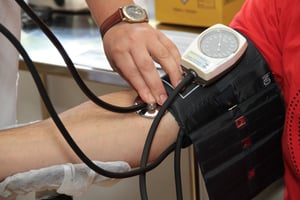February 2021 is American Heart Month!
The history behind AHM…
On Dec. 30, 1963, President Lyndon Johnson issued a proclamation establishing the month of February as American Heart Month.
In his address commemorating this decision, President Johnson encouraged “the people of the United States to give heed to the nationwide problem of the heart and blood-vessel diseases, and to support the programs required to bring about its solution.”
President Johnson’s efforts literally changed the nation’s perception of cardiovascular disease.
The following year, the Surgeon General’s Report on Smoking and Health was published on Jan. 11, 1964. Released by Surgeon General Dr. Luther Terry this eye-opening publication became the first federal government report to link smoking to lung cancer and heart disease.
What’s the theme of AHM 2021?
This year, AHM hopes to bring attention to the dangers of hypertension, or high blood pressure. Uncontrolled high blood pressure can lead to disability, a poor quality of life, or even a fatal heart attack or stroke.
What are the symptoms of hypertension?
According to WebMD, if your blood pressure is extremely high, then you’ll more than likely experience the following symptoms:
 Severe headaches
Severe headaches- Nosebleed
- Fatigue or confusion
- Vision problems
- Chest pain
- Difficulty breathing
- Irregular heartbeat
- Blood in the urine
- Pounding in your chest, neck or ears
What affect does Hypertension have on the heart?
In the opinion of the Mayo Clinic, untreated hypertension can result in the following heart-related problems:
- Coronary artery disease. Your arteries will narrow and therefore will have trouble supplying blood to your heart
- Enlarged heart. High blood pressure will force your heart to work harder to pump blood to the rest of your body
- Heart failure. Eventually, your high blood pressure will put more and more strain on your heart. This will cause the heart muscle to gradually become weaker and weaker.
What risk factors are related to heart disease?
WebMD insists that the following risk factors can play a major role in contributing to the development of heart disease:
- Smoking
- High LDL, or "bad" cholesterol
- Low HDL, or "good" cholesterol
- Physical inactivity
- Obesity
- Unmonitored diabetes
- Unresolved stress and anger
/GeoEnvironmental%20Science/Blogs/https___www.nhlbi.nih.gov_sites_default_files_2021-01_AHM_2021_OurHearts_Feb3_Final.jpg?width=600&name=https___www.nhlbi.nih.gov_sites_default_files_2021-01_AHM_2021_OurHearts_Feb3_Final.jpg) How can I participate in American Heart Month?
How can I participate in American Heart Month?
- Wear something red.
- Post something on our social media pages in honor of AHM.
- Start exercising on a regular basis.
- Have your blood pressure checked.
- Get a stress test.
- Avoid saturated fats, trans fats and excess sodium and sugar.
- Incorporate more fruits and vegetables, whole grains, lean poultry and fish into your diet.
- Learn how to perform CPR.
- Be supportive of someone who is trying to quit smoking
- Make a donation to an organization that supports research for heart disease.
If you’re interested in a career in the health field and helping people manage their diabetes, you should consider becoming a nurse. Currently, Hocking College in Nelsonville, Ohio, offers both a Registered Nursing program and a practical nursing to registered nursing transition program.
For more information on Hocking College’s nursing programs, contact Program Manager Sarah Frazier at one of the following:




